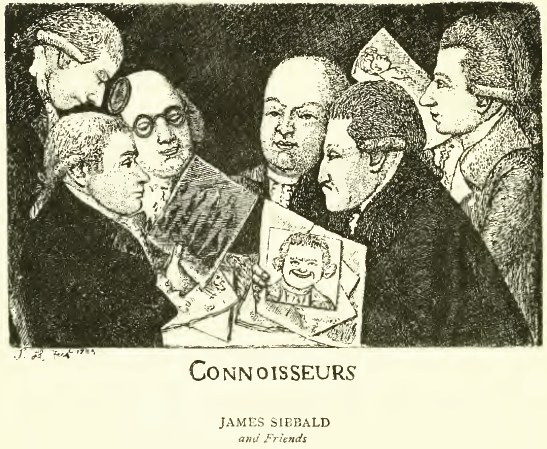Mr. James Sibbald holds
in his hand the print of the "Three Graces," which he is contemplating
apparently with much satisfaction.

Mr. Sibbald was the son
of a farmer at Whitelaw, in Roxburghshire, where he was born about 1747.
He received his education at the grammar-school at Selkirk. Although
fond of literary amusements, he does not seem to have contemplated
following any other profession than that of his father. Accordingly, his
first attempt to establish himself in the world was by becoming a lessee
of the farm of Newton, which he held from Sir Walter Elliot of Stobbs.
Here he carried on the business of farming for several years, relieving
the monotony of rustic life by literary and scientific pursuits. In May,
1779, however, finding the agricultural interest considerably depressed,
he sold off his stock, gave up his lease, and, without any fixed
purpose, repaired to Edinburgh with little more than a hundred pounds in
his pocket.
Having some acquaintance
with Mr. Charles Elliot, an eminent and enterprising bookseller, he
engaged for a short time as his shopman; and, in about a year
afterwards, bought the circulating library which had orginally belonged
to Allan Ramsay the poet.
[It was from this
library, originally established by the author of the "Gentle Shepherd,"
and we believe the oldest institution of the kingdom, that Sir "Walter
Scott, according to his own statement, read in his younger years with
such avidity. The collection latterly contained above thirty thousand
volumes. It was called the Edinburgh Circulating Library; but the
selection of books was very superior to what are usually to be met with
in collections of that description. Almost all the eminent men of last
century who studied in Edinburgh, as well as many of the present day
(some of whom now fill the first offices in the State), were readers of
this library. After the death of Mr. Sibbald, it was purchased and
greatly enlarged by Mr. Alexander Mackay—now of Blackcastle, in this
county—who was then a bookseller in the High Street; and who, upon
retiring from business about ten years ago, and not finding a purchaser
for the whole, sold it off by public auction.]
He then opened a bookseller's shop in the Parliament
Square, where, by a degree of enterprise surpassing his contemporaries,
lie soon obtained distinction. He was the first to introduce the better
order of engravings into Edinburgh, many of which were coloured to
resemble paintings. They were considered as altogether of foreign or
English manufacture, and as such were extensively purchased; but, having
been one day detected in the act of colouring them himself, from that
unlucky period his business in this line diminished.
In 1783, Sibbald commenced the Edinburgh Magazine,
which, was exceedingly well received, and in which, as editor and
principal contributor, he displayed much talent and great research. To
this work Lord Hailes was a contributor. The magazine was subsequently
conducted by Dr. Robert Anderson, author of the "Lives of the Poets,"
and published by Mr. Mackay.
Anxious to devote his attention exclusively to
literary pursuits, he formed an arrangement, in 1791, with two young
men, Lawrie and Symington, by which they were to have his stock and
business on payment of an annual sum. Mr. Sibbald then entered into a
newspaper speculation, the Edinburgh Herald, which he conducted,
but it did not continue for any length of time. He next went to London,
where he resided for a number of years, and produced a work, entitled "
Record of the Public Ministry of Jesus Christ," which was published at
Edinburgh in 1798.
While in London, his Scottish relations altogether
lost sight of him ; they neither knew where he lived, nor how he lived.
At length his brother William, a merchant in Leith, made particular
inquiry into these circumstances by a letter, which he sent through such
a channel as to be sure of reaching him. The answer was comprised in the
following words:—"My lodging is in Soho, and my business is so-so."
Mr. Sibbald again returned to Edinburgh, where, in
1797, he brought out a musical publication, entitled "The Vocal
Magazine.'" In a year or two afterwards the bookselling stock
devolved into his own hands, and he continued to carry on business as a
bookseller until his death. His next work, published in 1802, and by
which he is best known, was a selection from the early Scottish poets,
entitled "A Chronicle of Scottish Poetry, with a Glossary of the
Scottish Language"—a work of taste and erudition, and a valuable
accession to Scottish literature.
Mr. Sibbald died at his lodgings in Leith Walk, at
the age of fifty-six, in April, 1808. "He was a man of eccentric but
amiable character. He belonged to a great number of social clubs; and
was beloved by so many of his associates in those fraternities, that for
some years after his death they celebrated his birth-day by a social
meeting."

